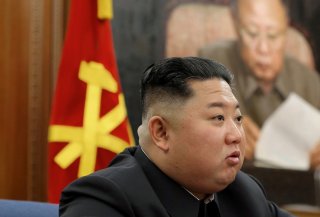North Korea Will Still be North Korea If Kim Jong-un Dies
Kim or no Kim, the regional balance of power will continue to dictate how the North Korean government operates. Unfortunately for Pyongyang, the balance of power will continue to be unfavorable. So if you’re expecting some sort of positive transformation or the dawn of a North Korean renaissance, prepare to have your hopes dashed.
Editor's Note: This is part of a symposium asking what happens if Kim Jong-un died. To read the other parts of the series click here.
Where in the world is Kim Jong-un?
Is he in critical condition after a cardiovascular surgery as rumors suggest? Is he lying in a hospital bed incapacitated, forcing political and military insiders in Pyongyang to wrack their brains for a succession plan? Or could Kim be skipping in a field somewhere in the North Korean countryside, writing letters to world leaders, and otherwise doing the people’s business as North Korean state media is reporting?
The truth is that nobody knows what is going on inside the reclusive nation. North Korea is the perfect example of an intelligence black-box, often confounding the world’s best operators, managers, and analysts at CIA headquarters on a weekly basis. We are all speculating on succession scenarios without the foggiest idea of what is reality and what is TMZ-style garbage.
Who would take over the helm from a dying Kim Jong-un is the wrong question to ask. The question U.S. national security officials in Washington and Korea experts around the world should be focusing on is whether Kim leaving this earth would make a big difference one way or the other. The answer will be disappointing for those who hope to see North Korea’s foreign policy move in a more constructive direction.
Pundits like to prognosticate about personalities as if they are the driving force of international politics. Palace intrigue in exciting, particularly when the subject of the intrigue is the Kim regime, an entity that has defied projections of its imminent demise for decades. However, with the exception of South Africa’s Nelson Mandela, individuals are rarely able to reform a state’s system of government or completely overhaul its approach to the world. Mikhail Gorbachev may have introduced perestroika and glasnost to Moscow in the mid-1980s, but he was only one chapter in the story of the Soviet Union’s dissolution. The inefficiency of the Soviet economic system, an inability to keep pace with the United States technologically and militarily, and a series of events outside of its control had more to do with the Cold War ending on Washington’s terms than the decisions of a single member of the politburo.
It’s highly unlikely Pyongyang’s red-lines on denuclearization, its overall relationship with Washington, or its openness to a detente with South Korea will depart from the status-quo in the event of Kim’s death. Regardless of who rules in Pyongyang—whether it’s the North Korean military or Kim’s sister, Kim Yo Jong—North Korea will face the same strategic environment as it did when Kim was calling the shots. It will remain under a U.S. and U.N. Security Council sanctions regime that severely handicaps the North Korean economy and places restrictions on virtually every income stream the government relies on. The North will contend with the same geography, surrounded by regional powers far wealthier, geopolitically significant, and militarily capable than its own. Paramount concerns about stability and internal security will render any discussion of trading the North’s nuclear weapons program for diplomatic normalization and economic sanctions relief moot—making the prospects of denuclearization as infinitesimal in the future as it is today.
Mapping state behavior is not as simple as looking at the character of the ruling individual. It’s a lesson Washington never seems to learn; U.S. policymakers remain steadfast in their naive belief that changing regimes will magically result in a flowering democratic utopia (or at the very least a new government with a pro-American foreign policy).
Kim or no Kim, the regional balance of power will continue to dictate how the North Korean government operates. Unfortunately for Pyongyang, the balance of power will continue to be unfavorable. So if you’re expecting some sort of positive transformation or the dawn of a North Korean renaissance, prepare to have your hopes dashed.
Daniel R. DePetris is a fellow at Defense Priorities and a columnist at the Washington Examiner.
Image: Reuters.

